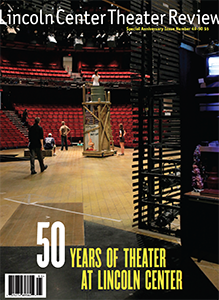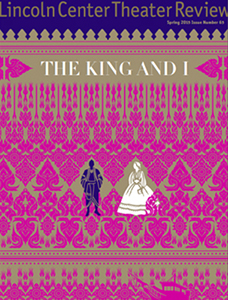On Monday, January 11, at 6:30 pm, the Martin E. Segal Center at the CUNY Graduate Center, in New York, will present an evening in celebration of the Lincoln Center Theater Review. The Review was founded in 1987 by award-winning playwright John Guare, who serves currently as its co-Executive Editor, along with LCT’s Dramaturg, Anne Cattaneo. It features contributions from noted artists and writers in the belief that theater plays a part in the intellectual discourse of our time.
The other day, I asked Guare and Cattaneo about the magazine’s origins. “We began in 1987, when the theater, led by Gregory Mosher, decided to do a season of work by South African playwrights.” Guare added that none of the New York papers, including the Times, wanted to cover the event. “So Gregory scheduled a public forum to get the word out. We recorded the event and started the magazine to publish the remarks.”
Guare said that “the magazine has gone through several stages, and finally found the right format when Tamar Cohen became part of it.” (Cohen, the magazine’s art director for the past 22 years, will be part of the Segal Center event, as will the Review’s editor, Alexis Gargagliano, and its picture editor, David Leopold.)
Cattaneo mentioned that “Lincoln Center’s name is a powerful calling card – and we find countless writers of international reputation eager to write about our plays and join us at the theater on opening night.”
Guare spoke about a few of those highly regarded writers. “When we were doing a issue to coincide with a production of Waiting for Godot,” he said, “I contacted Richard Howard, because I had long been an admirer of his poetry. He mentioned that he had written a poem called ‘Waiting for Samuel Beckett,’ which was inspired by the time that he was waiting to see Beckett. So we were able to publish that poem.”
Personal reminiscence has also been a part of the Review’s history. When the theater was preparing to do South Pacific, in 2008, Cattaneo said, “We were looking for a major writer whose experience had touched the war. Everyone had passed, but James Salter knew the Korean War and it was serendipity that we discovered to our joy and surprise how much he admired James Michener” – who wrote Tales of the South Pacific, the basis for the musical.
Cattaneo went on: “And we were thrilled to find that Witi Itimuri, the Maori author of Whale Rider, had personally met Michener in the South Pacific when he, Itimuri, was a young author, and how Michener had encouraged him to continue writing.”
Guare likened the assembly of each issue to “a cliffhanger”: “We contact Margaret Atwood, say, or Cynthia Ozick, or any number of other brilliant writers and artists, and see if they might be able to contribute, and then hope that they say yes.”
Such top-quality contributors are essential, Guare said, for the magazine to fulfill its mission of making theater integral to broad cultural discussion. “Theater isn’t just a way to kill time on a Saturday night. I believe it’s one of the few places we still have where we can tell the truth.”
Helping the audience discover a play’s many layers, explained Cattaneo, is crucial to the Review’s content. “Our issue devoted to LCT’s current play, Dada Woof Papa Hot,” she said, “is a good example of how we open up work to thoughtful discussion – gay and straight audiences, both single and married.” She added: “We aim to provide information about writers and personalities who may have been forgotten.” Examples include Review issues covering Clifford Odets and Katharine Cornell.
As part of its mission to provide context for an LCT production, the Review, said Guare, “should function as an ideal companion. It should give you things that you can talk about at dinner after seeing the show, as well as articles and visual material that you’ll want to go back to days later.”
Brendan Lemon is the editor of lemonwade.com.

